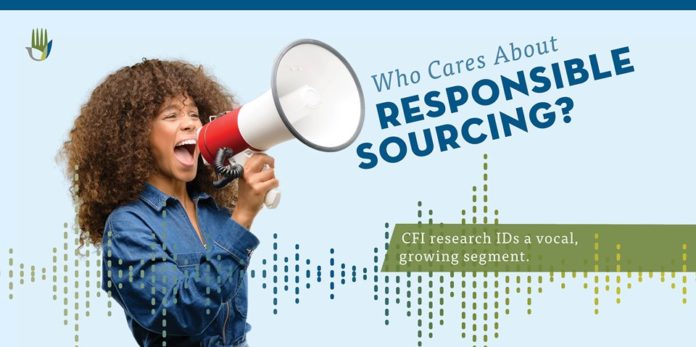
KANSAS CITY, Mo. – July 17, 2019 – One in four Americans is actively engaged in online conversations about responsible sourcing and food, according to the latest consumer research from The Center for Food Integrity (CFI). The findings reveal a growing and very vocal segment that wants to make a positive impact on society and influence others to do the same.
“These consumers are not silent bystanders,” said Terry Fleck, CFI executive director. “Their priority is to advocate for a new moral standard for consumption by choosing products that promote social justice, equality, environmental sustainability and animal well-being.”
The “Cool Foodie” and Social Reform
The CFI digital insights research, which analyzed millions of online engagements in real time, identifies a segment of white, middle class individuals between the ages of 25 and 54. It’s made up of mostly singles or couples without children.
“Picture a socially conscious consumer who considers themselves a ‘cool foodie,’” said Fleck. “It’s someone who doesn’t shop in traditional supermarkets – but purchases beef raised without antibiotics from a specialty butcher, always chooses cage-free eggs and dines at trendy restaurants where organic food is prominent on the menu.”
The findings profile consumers motivated to adjust their way of living to what they believe is ethical, sustainable and moral, and trusts that institutions and authorities truly understand the needs of society and will do the right thing.
“They are driven by a fear that society’s consumption habits will ultimately harm their health and the planet,” he said, “and that they won’t make a difference in the world despite efforts to live a life guided by ethics.”
These consumers are highly progressive and have a strong sense of responsibility to support or advocate for the improvement of society through reform, according to the research. They place high expectations on the food system to provide products that align with their values and that are sourced from suppliers who are responsible and care about people, animals and the planet.
When it comes to responsible sourcing and animals specifically, the research shows a segment of consumers who are deeply motivated to have total control over their consumption. They feel society is made up of mindless consumers unaware of negative societal impacts of animal production and they will vote with their wallets to send a message that purchasing products sourced from animals treated humanely is right and just.
How to Engage
“It’s a segment that’s here to stay,” said Fleck, as the research predicts a market expected to grow by 4 percent to 49.8 million in the next 12 to 24 months. “It’s important that companies, restaurants and retailers assess their outreach to determine if they’re engaging enough with this audience to tout sustainability and responsible sourcing efforts, and if they’re engaging in a way that earns trust.”
“All consumers want those producing their food to be upfront and honest and want assurances that the values of the company align with theirs. CFI research shows that values are the key to earning trust,” said Fleck. “However, the segment interested in responsible sourcing is even more in tune with the values of an organization and has very high expectations.”
To learn more about the CFI Illuminate research findings log on to www.foodintegrity.org or contact Fleck at [email protected].
###
The Center for Food Integrity is a not-for-profit organization that helps today’s food system earn consumer trust. Our members and project partners, who represent the diversity of the food system, are committed to providing accurate information and working together to address important issues in food and agriculture. The Center does not lobby or advocate for individual companies or brands. For more information, visit www.foodintegrity.org.







